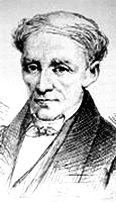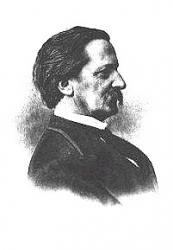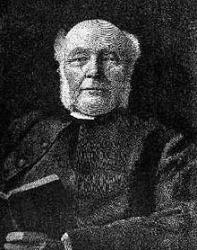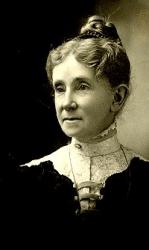Planning worship?
Check out our sister site, ZeteoSearch.org,
for 20+ additional resources related to your search.
- |
User Links
Person Results
‹ Return to hymnal







Export as CSV
W. Howard Doane

1832 - 1915 Person Name: W. H. Doane Hymnal Number: 42 Composer of "[Safe in the arms of Jesus]" in Childhood Songs An industrialist and philanthropist, William H. Doane (b. Preston, CT, 1832; d. South Orange, NJ, 1915), was also a staunch supporter of evangelistic campaigns and a prolific writer of hymn tunes. He was head of a large woodworking machinery plant in Cincinnati and a civic leader in that city. He showed his devotion to the church by supporting the work of the evangelistic team of Dwight L. Moody and Ira D. Sankey and by endowing Moody Bible Institute in Chicago and Denison University in Granville, Ohio. An amateur composer, Doane wrote over twenty-two hundred hymn and gospel song tunes, and he edited over forty songbooks.
Bert Polman
============
Doane, William Howard, p. 304, he was born Feb. 3, 1832. His first Sunday School hymn-book was Sabbath Gems published in 1861. He has composed about 1000 tunes, songs, anthems, &c. He has written but few hymns. Of these "No one knows but Jesus," "Precious Saviour, dearest Friend," and "Saviour, like a bird to Thee," are noted in Burrage's Baptist Hymn Writers. 1888, p. 557.
--John Julian, Dictionary of Hymnology, Appendix, Part II (1907)
===================
Doane, W. H. (William Howard), born in Preston, Connecticut, 1831, and educated for the musical profession by eminent American and German masters. He has had for years the superintendence of a large Baptist Sunday School in Cincinnati, Ohio, where he resides. Although not a hymnwriter, the wonderful success which has attended his musical setting of numerous American hymns, and the number of his musical editions of hymnbooks for Sunday Schools and evangelistic purposes, bring him within the sphere of hymnological literature. Amongst his collections we have:—
(1) Silver Spray, 1868; (2) Pure Gold, 1877; (3) Royal Diadem, 1873; (4) Welcome Tidings, 1877; (5) Brightest and Best, 1875; (6) Fountain of Song; (7) Songs of Devotion, 1870; (8) Temple Anthems, &c.
His most popular melodies include "Near the Cross," "Safe in the Arms of Jesus," "Pass me Not," "More Love to Thee," "Rescue the Perishing," "Tell me the Old, Old Story," &c.
- John Julian, Dictionary of Hymnology (1907)
W. Howard Doane
Mira Rowland
Person Name: M. R. Hymnal Number: 14 Arranger of "Abide with Me" in Childhood Songs
Mira Rowland
Walter Bond Gilbert

1829 - 1910 Person Name: G. B. Gilbert, Mus. D. Hymnal Number: 105 Composer of "[Little trav'llers Zionward]" in Childhood Songs Walter Bond Gilbert DMus United Kingdom 1829-1910. Born at Exeter, Devon, England, he studied music under Alfred Angel, Samuel Wesley and Henry Bishop. He attended New College, Oxford and the University of Toronto, Canada. He was organist in Devon at Topsham in 1847, Bideford in 1849, Kent at Tonbridge in 1854, Old Colliegiate Church, Maidstone in 1859, Lee in 1866, Boston, Lincolnshirein 1868, and Trinity Chapel in New York City in 1869-1897. He taught music at Tonbridge School, helped found the College of Organists, edited the America Episcopal Hymnal, and wrote a number of monographs, including “Antiquities of Maidstone”. He continued to write church music, producing services, oratorios (including “The Restoration of Israel and St. John, 1857), organ works, and anthems. He died at Headington, Oxford, England.
John Perry
Walter Bond Gilbert
Emily M. C. Shapcote
1828 - 1909 Person Name: Mrs. E. Shapcote Hymnal Number: 26 Author of "Jesus, Holy, Undefiled" in Childhood Songs Shapcote, Emily Mary, née Steward (p. 1589, ii., as Mrs. Shepcote), was b. at Liverpool in 1828, and m. in 1856 the Rev. E. G. Shapcote (1852, curate of Odiham, Hants, later Missionary in S. Africa under the S.P.G.). In 1866 she was received into the Church of Rome, and her husband two years later. She now (1906) resides at Torquay. The Hymns for Infant Children (p. 1589) were pub. by Masters in 1852 (not 1840), those marked E being by Mrs. Shapcote, those marked A by her aunt, Mary Steward, those marked C by her sister, Eleanor Steward. Her more recent hymns appeared principally in her Eucharistic Hours, 1886. Those in common use include:—
1. Heavenly Father, from Thy throne. [Litany.] In 1852 as above, No. 20, the second St. beginning, "Jesus, Saviour, holy, mild." In Church Hymns, 1871 and 1903, and others, it is given, with many slight alterations, as "Jesus, holy, undefiled" (p. 1589, ii.).
2. 0 Jesus, dearest Lord, I cry to Thee. [Holy Communion.] In 1886 as above, p. 112, dated Clapham,
1876. It was rewritten by Dr. H. A. Rawes in his Little Handbook of the Archconfraternity of the Holy Ghost, 1879, as "O Jesus, hidden God, to Thee."
3. Queen of the Holy Rosary. [B. V. M.] Written about 1882, and included in St. Dominic's Hymn Book, 1885 and 1901, A. E. Tozer's Catholic Hymns, 1898, &c.
Her translation of "Salve mundi salutare " is noted at p. 1697, ii. [Rev. James Mearns, M.A.]
--John Julian, Dictionary of Hymnology, New Supplement (1907)
Emily M. C. Shapcote
Wilhelm Hey

1789 - 1854 Person Name: W. Hey Hymnal Number: 58 Author of "God the Father in Heaven" in Childhood Songs Hey, Johann Wilhelm, son of H. A. Hey, pastor at Leina, near Gotha, was born at Leina, March 26, 1789. He studied at the Universities of Jena and Göttingen, became in 1811 licentiate in theology, and, after varied tutorial work, was appointed in 1818 pastor at Töttelstadt, near Gotha. In 1827 he became court preacher at Gotha, where his preaching attracted large audiences, but being regarded as a Pietist, was in 1832 appointed superintendent of Ichtershausen. He died at Ichtershausen, May 19, 1854 (Koch, vii. 262-266; Allgemeine Deutsche Biographie, xii. 344-345; MS. from Pfarrer Ortlob of Leina).
Hey's poems were mostly written for children. The best known are his Fabeln für Kinder, with illustrations by Otto Speckter, of which the first fifty appeared at Hamburg, 1833, the second fifty in 1837. Since then they have passed through a large number of editions in German, and have been several times translated into English. At the end of each series is a "Serious Appendix," containing religious and moral songs. The whole of these two Appendices have been translated into English as Hymns and Poems for Little Children. Translated from the German. London, 1853. Also in the Fifty Fables, 1867, and Other Fifty Fables, 1869, translated by Sophie Klingemann, and published by F. A. Perthes at Gotha.
Very few of Hey's hymns are suited for Church use. Those which we have to note are:—
I. Hymns for Church Use.
i. Wenn auch vor deiner Thür eimnal. Christian Charity. First published in Knapp's Christoterpe, 1835, p. 68, in 9 stanzas of 4 lines, as the fifth hymn of a series on the words "Behold I stand at the door and knock," Rev. iii. 20. In Knapp's Evangelischer Lieder-Schatz, 1837, No. 2412 (1865, No. 2146), it was altered to "Christ! wenn die Armen manchesmal," and this form passed into the Württemberg Gesang-Buch 1842, and other recent collections. The only translation is, "Ah, Christian! if the needy poor," by Mrs. Findlater, in Hymns from the Land of Luther, 3rd Ser, 1858, p. 30 (1884, p. 152).
ii. Wenn je du wieder zagst. Passiontide. On Christ in the Garden of Gethsemane. First published in Severin Vater's Jahrbuch für häusliche Andacht, Gotha, 1824, p. 173, as No. 9 of the "Reminiscences of the sufferings of Jesus; for the Quiet Days of the week before Easter," in 9 stanzas of 8 lines, with the motto "Not my will, but Thine be done." Included in Bunsen's Versuch, 1833; Knapp's Evangelischer Lieder-Schatz, 1850 and 1865, &c.
Translated as:—
Whene'er again thou sinkest. A good and full translation by Miss Winkworth in her Lyra Germanica, 2nd Ser., 1858, p. 26, and repeated, abridged, in Psalms & Hymns, Bedford, 1864, and in Holy Song, 1869.
II. Hymns for Children.
All those to be noted appeared in the Appendix to the 2nd Series of his Fabeln für Kinder, Hamburg, 1837.
iii. Alle Jahre wieder, kommt das Christus Kind. Christmas. 1837, p. 31, in 3 st. The translations are: (1) "The blessed feast of Christmas," in Hymns & Poems, 1853, p. 81. (2) "Every year that endeth," by Sophie Klingemann, 1869, p. 31. (3) "As each happy Christmas," by Mrs. H. K. Spaeth, as No. 33 in the Little Children's Book, Philadelphia, 1885.
iv. Aus dem Himmel ferne. God our Father. 1837, p. 7, in 4 stanzas. The translations are: (1) "From the glorious heav'n above," in Hymns & Poems, 1853, p. 49. (2) "From the glorious heaven," by Mrs. Sevan, 1859, p. 139. (3) “From the angels' dwelling," in Dr. F. Silcher's Song Book for the Young, Nelson, 1868, No. 1. (4) "From His heaven above," by Sophie Klingemann, 1869, p. 7. (5) "From the far blue heaven," as No. 676, in the Tribute of Praise, Boston, U.S., 1873.
v. Glöcklein klingt, Vöglein singt. Thanksgiving. 1837, p. 17 (in the ed. 1886, n.d., as part of Sonnentchein, Sternelein),in 5 stanzas. The translations are: (1) "The bells they ring, The birds they sing," in Hymns & Poems, 1853, p. 63. (2) "Bells do ring, birds do sing," in Silcher's Song Book, 1868, No. 9. (3) "Bells are ringing, Birds are singing," by Sophie Klingemann, 1869, p. 17. (4) "Church bells ring," by Mrs. H. R. Spaeth, in Little Children's Book 1885, No. 72.
vi. Weisst du wie viel Sternlein stehen. God's care of His creatures. 1837, p. 20, in 3 stanzas. The translations are: (1) "Canst thou sum up each brilliant star." In Hymns & Poems, 1853, p. 67. (2) "How many stars are shining," by Mrs. Bevan, 1859, p. 144. (3) "Can you tell the countless number," by Sophie Klingemann, 1869, p. 20. (4) "Canst thou count the stars that twinkle," in the Rev. C. S. Bere's Children's Choral Book, 1869, p. 4, repeated as No. 425 in the Universal Hymn Book,1885.
vii. Wen Jesus liebt Der kann allein. Love of Christ. 1837, p. 37, in 4 stanzas. The translations are: (1) "They who love Jesus alone can be gay," in Hymns & Poems, 1853, p. 90. (2) "The love of Christ makes ever glad," by Sophie Klingemann, 1869, p. 37. (3) "Whom Jesus loves," by Mrs. H. R. Spaeth, in Service & Hymns for Sunday Schools (Southern Lutheran), Philadelphia, 1883, p. 178. (4) "Whom Christ holds dear," by Prof. M. H. Richards, as No. 98 in the Little Children's Book, Philadelphia, 1885. [Rev. James Mearns, M.A.]
--John Julian, Dictionary of Hymnology (1907)
Wilhelm Hey
F. A. Gore Ouseley

1825 - 1889 Person Name: F. A. G. Ouseley Hymnal Number: 29 Composer of "[Jesus, Saviour, Son of God]" in Childhood Songs Born: August 12, 1825, London, England.
Died: April 6, 1889, Hereford, England.
Buried: Church of St. Michael and All Angels, Tenbury Wells, Hereford and Worcester, England.
Gore-Ouseley was educated at Oxford University (BA 1846, MA 1849, DMus 1854), and was ordained in 1849. In 1855, he was appointed Oxford Professor of Music, succeeding Henry Bishop. At that time, Oxford music degrees were easy to obtain, as there were no conditions of residence. Candidates only had to submit a musical composition, (e.g., for choir or orchestra). This was then approved by the examiner, rehearsed and performed to a small, select audience at Oxford. As far as Ouseley was concerned, this only meant two or three trips to Oxford each year, usually for two or three days each time, as there was no music "taught" in the university and very little in Oxford itself at the time.
Also in 1855, Ouseley was appointed Precentor of Hereford Cathedral, a post he held for the next 30 years, before becoming a Canon there. Although theoretically in charge of the cathedral choir, Ouseley only had to be in residence at the cathedral two months each year, and he arranged these to take place during the summer vacation, when he was not required to be at his College, although such was his commitment that he did make regular visits to the cathedral, which was only 18 miles from his College at St. Michael’s.
His College of St. Michael’s, Tenbury, a "model" choir school, opened in 1856, mostly at his own expense. He founded the College and was its first Warden, which was the greater part of his work for the next 33 years.
Ouseley’s compositions covered a wide range: operas, songs, chamber music and organ pieces. His works include the following treatises:
Harmony (London: 1868)
Counterpoint (London: 1869)
Canon and Fugue (London: 1869)
Form and General Composition (London: 1875)
--www.hymntime.com/tch/
F. A. Gore Ouseley
Josiah G. Holland

1819 - 1881 Person Name: Dr. J. G. Holland Hymnal Number: 69 Author of "There's a Song in the Air" in Childhood Songs Holland, Josiah Gilbert, was born at Belchertown, Massachusetts, July 24, 1819. He was for some time on the staff of the Springfield Republican, and became in 1870 the editor of Scribner's Magazine. He has written several successful books, and some poetical pieces. One of the latter, "For summer's bloom, and autumn's blight" (Praise in and through all things), was included, from Bitter Sweet, 1858, in the Boston Unitarian Hymn [and Tune] Book for the Church & Home, 1868. He died Oct. 12, 1881.
--John Julian, Dictionary of Hymnology (1907)
===============
Holland, J. G. , p. 529, ii. His Christmas Carol, “There's a star in the sky," from The Marble Prophecy and other Poems, 1872, is included in the American Methodist Hymnal, 1905. He died Oct. 12, 1881. [Rev. L. F. Benson, D.D.]
--John Julian, Dictionary of Hymnology, New Supplement (1907)
Josiah G. Holland
J. Erskine Clarke

1827 - 1920 Person Name: J. E. Clark Hymnal Number: 53 Author of "Jesus, High in Glory" in Childhood Songs John Erskine Clarke (1827–1920) was a British clergyman who issued the first parish magazine. He established several other religious publications and was responsible for founding churches schools and hospitals in Battersea. He also competed at Henley Royal Regatta.
See also in:
Wikipedia
J. Erskine Clarke
Emily Huntington Miller

1833 - 1913 Person Name: Emily H. Miller Hymnal Number: 57 Author of "Jesus Bids Us Shine" in Childhood Songs Miller, Emily, née Huntingdon, daughter of the Rev. Thomas Huntington, D.D., was born at Brooklyn, Connecticut, Oct. 22, 1833: and was subsequently married to Professor Miller. Mrs. Miller is joint editor of The Little Corporal, published at Chicago, in which several of her poetical pieces appeared. Of her hymns the most widely known are:—
1. Enter Thy temple, glorious King. Opening of a Place of Worship. This was written for the opening of the Methodist Episcopal Church, at Akron, Ohio, 1861; and is in several collections, including the Methodist Episcopal Hymnal, 1878.
2. I love to hear the story. Early Piety. Written for and published in The Little Corporal, 1867. This is in extensive use in Great Britain and America. It was included in Hymns Ancient & Modern, in 1875.
3. Beyond the dark river of death. Heaven.
4. Blessed are the children. Early Piety.
5. Father, while the shadows fall. Evening.
6. Hark, the chorus swelling. Christmas.
7. I love the name of Jesus. Holy Name Jesus.
8. Jesus bids us shine. Early Piety.
9. Stay, trembling soul, and do not fear. Holy Communion.
10. Work and never weary, though thy strength be small. Perseverance.
Of these hymns, No. 7 is in the 1878 Additional Hymns to the Leeds Sunday School Hymn Book; No. 8, is in Barrett's Book of Praise for Children, 1881; No. 9, in Common Praise, 1879; and Nos. 4, 5, 6, and 10, in E. Hodder's New Sunday School Hymn Book, 2nd ed., 1868.
--John Julian, Dictionary of Hymnology, Appendix, Part II (1907)
=======================
Miller, Emily, née Huntington, p. 1579, ii. Of Mrs. Miller's hymns, Nos. 4, 5, 6 and 10 were written for and first printed in The Little Corporal, as follows: 4—April, 1868; 5—Aug. 1868; 6—May, 1868; and 10—Sept. 1868. Nos. 7, 8, and 9 are not hers. No. 8, "Jesus bids us shine," she informs us is by Susan Warner. [Rev. James Mearns, M.A.]
--John Julian, Dictionary of Hymnology, New Supplement (1907)
Emily Huntington Miller
W. K. Bassford
1839 - 1902 Hymnal Number: 46 Composer of "[Can a little child like me]" in Childhood Songs Bassford, William Kipp was born on April 23, 1839, in New York City. He first studied harmony and composition under Samuel Jackson, who was for some time organist at St. Bartholomew’s Church in New York. While still young, he traveled extensively with a concert troupe as a pianist. He eventually settled in New York as a teacher, where he was living as of 1885. He wrote a number of secular songs, a mass in E♭, and some other church pieces. He also wrote a two-act opera, Cassilda. He died on December 22, 1902 in New York City.
© The Cyber Hymnal™ (www.hymntime.org/tch)
W. K. Bassford


 My Starred Hymns
My Starred Hymns


